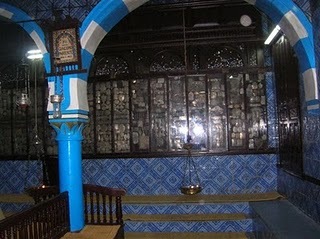The rubbish is piled high amongst the blue and white dwellings of Hara Seghira, the Jewish quarter of the Tunisian island of Djerba, but the locals are not worried. The government will do a thorough clean-up just before the holiday of Lag Ba'omer. That's when thousands of visitors will flock to take part in the Hillula or pilgrimage in honour of Rabbi Shimon Bar Yochai.
It may surprise outsiders to learn that the Hillula at the Al-Ghriba synagogue, which legend has it is over 2,000 years old, has been a fixture of the Djerba tourist calendar only for the last forty years. The Hillula was initiated by the Tunisian government and is a major revenue-earner.
Tourism is the mainstay of Tunisia, sandwiched between its oil and gas-producing neighbours Algeria and Libya. The al-Ghriba synagogue is the main attraction on Djerba, a must-see on every tourist's itinerary.
The 1,200 Jews who still live on the island around the synagogue and seven kilometres away in the Hara Kebira - the main Jewish ghetto with its 11 synagogues - are like highly-prized exhibits in the Tunisian shop window. A police station guards the entrance to the Hara Kebira. Keep the Jews safe and secure, so official thinking goes, and the thousands of German, French and even Israeli tourists to Djerba will keep on coming.
Jews visit the main Muslim town unmolested. They say the kippa on their heads is their insurance policy. They feel safer here than they would in Paris.
But tourist numbers have only been recovering in the last two years following the devastating al-Qaeda attack on the al-Ghriba synagogue in 2002, in which 21 people died. An explosives-laden truck positioned itself outside the main entrance so that the maximum number of Jews inside the synagogue would be killed. In the event, not a single Jew died - only German tourists and Tunisians.
The Tunisian government, under the long-term dictatorship of President Zine Ben Ali, has taken draconian measures to protect the synagogue. You would not guess it from the tourist brochures, but the government keeps an iron grip on dissent and fundamentalism in the country. It was recently voted one of the most media-unfriendly of regimes by international reporters.
Journalist and academic Shaul Zadka, who gave a talk last week in London (arranged by Spiro Ark and Harif) about Jewish Djerba, was struck by the fact that the Jews who live on Djerba are free to visit Israel, although they must fly via Istanbul. The Jews of Djerba are increasingly devout but inward-looking. Whereas previous generations attended public schools and learned French and Arabic, the current generation is educated in the Jewish quarter's Yeshivot and speaks fluent Hebrew as well as Arabic. They appear to behave as Israeli expatriates, glued to Israel radio broadcasts all day-long.
Jews are permitted to hold joint Tunisian-Israeli nationality. In the last elections, some 400 cast their votes in a polling station in west Jerusalem for the only presidential candidate, Ben Ali, who secured over 90 percent of the votes. Supervising the proceedings was the Tunisian ambassador to the Palestinian territories.
While Ben Ali is in charge, the Jews of Djerba feel secure. But the president is now 71. The Djerba idyll may not continue forever.
The photo by Shaul Zadka shows the interior of the al-Ghriba synagogue.




